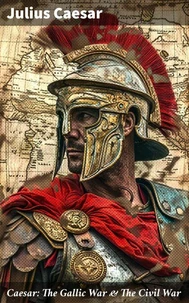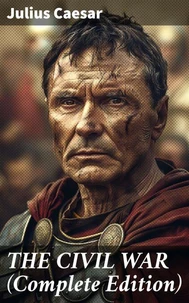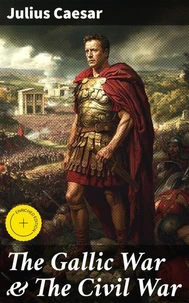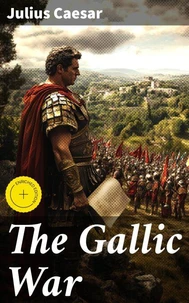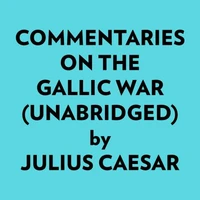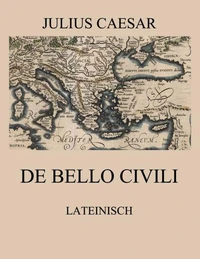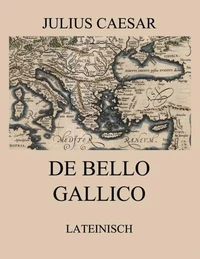The Civil War
Par : , ,Formats :
Disponible dans votre compte client Decitre ou Furet du Nord dès validation de votre commande. Le format ePub est :
- Compatible avec une lecture sur My Vivlio (smartphone, tablette, ordinateur)
- Compatible avec une lecture sur liseuses Vivlio
- Pour les liseuses autres que Vivlio, vous devez utiliser le logiciel Adobe Digital Edition. Non compatible avec la lecture sur les liseuses Kindle, Remarkable et Sony
 , qui est-ce ?
, qui est-ce ?Notre partenaire de plateforme de lecture numérique où vous retrouverez l'ensemble de vos ebooks gratuitement
Pour en savoir plus sur nos ebooks, consultez notre aide en ligne ici
- Nombre de pages113
- FormatePub
- ISBN859-65--4739922-3
- EAN8596547399223
- Date de parution13/11/2022
- Protection num.Digital Watermarking
- Taille252 Ko
- Infos supplémentairesepub
- ÉditeurDIGICAT
Résumé
In "The Civil War, " Julius Caesar offers a firsthand account of the conflict between the Roman Republic and its internal factions, deftly navigating the tumultuous political landscape of his time. Written in a lucid and compelling prose style, the text exemplifies the use of direct speech and vivid detail to bring the events to life, revealing not only military strategies but also the socio-political implications of the war.
Its importance lies in its dual role as a historical document and a literary masterpiece, echoing the themes of power, loyalty, and betrayal within the greater context of Roman history. Julius Caesar, a military general and politician, draws from his own experiences in the field to craft this narrative, solidifying his position as not only a pivotal figure in Roman history but also as a skilled author.
His acute understanding of military tactics, coupled with his political aspirations, significantly informed his portrayal of the events, reflecting his motivations and the complexities of leadership in times of civil strife. Caesar's reflection on his adversaries, such as Pompey, provides deep insight into the personal dynamics that fueled the conflict. For readers interested in the intricacies of power and governance, "The Civil War" serves as an essential text.
It not only illuminates the historical circumstances of a pivotal period in Roman history but also invites readers to consider the enduring nature of conflict and the fragility of political alliances. This work is not just a military account but an exploration of human ambition and the moral dilemmas that accompany it.
Its importance lies in its dual role as a historical document and a literary masterpiece, echoing the themes of power, loyalty, and betrayal within the greater context of Roman history. Julius Caesar, a military general and politician, draws from his own experiences in the field to craft this narrative, solidifying his position as not only a pivotal figure in Roman history but also as a skilled author.
His acute understanding of military tactics, coupled with his political aspirations, significantly informed his portrayal of the events, reflecting his motivations and the complexities of leadership in times of civil strife. Caesar's reflection on his adversaries, such as Pompey, provides deep insight into the personal dynamics that fueled the conflict. For readers interested in the intricacies of power and governance, "The Civil War" serves as an essential text.
It not only illuminates the historical circumstances of a pivotal period in Roman history but also invites readers to consider the enduring nature of conflict and the fragility of political alliances. This work is not just a military account but an exploration of human ambition and the moral dilemmas that accompany it.
In "The Civil War, " Julius Caesar offers a firsthand account of the conflict between the Roman Republic and its internal factions, deftly navigating the tumultuous political landscape of his time. Written in a lucid and compelling prose style, the text exemplifies the use of direct speech and vivid detail to bring the events to life, revealing not only military strategies but also the socio-political implications of the war.
Its importance lies in its dual role as a historical document and a literary masterpiece, echoing the themes of power, loyalty, and betrayal within the greater context of Roman history. Julius Caesar, a military general and politician, draws from his own experiences in the field to craft this narrative, solidifying his position as not only a pivotal figure in Roman history but also as a skilled author.
His acute understanding of military tactics, coupled with his political aspirations, significantly informed his portrayal of the events, reflecting his motivations and the complexities of leadership in times of civil strife. Caesar's reflection on his adversaries, such as Pompey, provides deep insight into the personal dynamics that fueled the conflict. For readers interested in the intricacies of power and governance, "The Civil War" serves as an essential text.
It not only illuminates the historical circumstances of a pivotal period in Roman history but also invites readers to consider the enduring nature of conflict and the fragility of political alliances. This work is not just a military account but an exploration of human ambition and the moral dilemmas that accompany it.
Its importance lies in its dual role as a historical document and a literary masterpiece, echoing the themes of power, loyalty, and betrayal within the greater context of Roman history. Julius Caesar, a military general and politician, draws from his own experiences in the field to craft this narrative, solidifying his position as not only a pivotal figure in Roman history but also as a skilled author.
His acute understanding of military tactics, coupled with his political aspirations, significantly informed his portrayal of the events, reflecting his motivations and the complexities of leadership in times of civil strife. Caesar's reflection on his adversaries, such as Pompey, provides deep insight into the personal dynamics that fueled the conflict. For readers interested in the intricacies of power and governance, "The Civil War" serves as an essential text.
It not only illuminates the historical circumstances of a pivotal period in Roman history but also invites readers to consider the enduring nature of conflict and the fragility of political alliances. This work is not just a military account but an exploration of human ambition and the moral dilemmas that accompany it.



